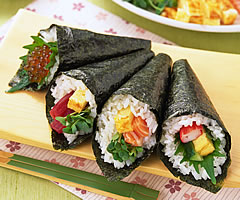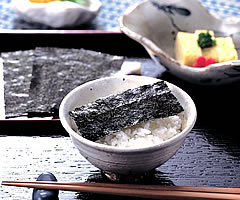Nutrition Facts

Japanese Roasted Seaweed ”YAKI NORI”
(per100g)
| Energy | 188kcal |
|---|---|
| Protein | 41.4g |
| Fat | 3.7g |
| Carbohydrate | 44.3g |
| Sodium | 530mg |

Japanese Seasoned Seaweed ”AJI NORI”
(per100g)
| Energy | 350kcal |
|---|---|
| Protein | 27.7g |
| Fat | 3.2g |
| Carbohydrate | 52.5g |
| Sodium | 2,260mg |
Allergy information:
Manufactured on the same equipment that processes Wheat,Prawns,Soy.
Storage Method:
Avoid high temperature,high humidity,and direct sunlight. Best served soon, after opening the package.
Nori is a great source of nutrition.
Nori is called “soybean of sea” and “vegetable of sea” in Japan. Nori is rich in various nutrients; minerals, vitamins, dietary fibres, etc. They are the nutrients that people lacks in modern days.
・Protein
40% of nori is made of a protein and this is comparable to soybean. The amount of the protein included in 1 sheet of nori is equivalent to 1/5 of egg. Furthermore, protein of nori contains all of the essential amino acids; this means protein of nori is excellent in terms of quantity and quality.
・Vitamins
Nori contains a lot of vitamins, especially vitamin A, B1, B2, C; 10-100times more than that of ordinary vegetables. Eating 2 sheets of nori will get you enough vitamin A, B1, B2 for a day.
・Minerals
Nori contains various minerals; potassium, calcium, magnesium, iron, zinc, etc. Eating 1 sheet of nori will get you enough iron for a day. Eating nori is great anemia prevention.
・Dietary Fibre
We tend to lack dietary fibre nowadays. We all know vegetables contain fibres, but nori is also rich in fibres. In addition, fibre of nori is softer than that of vegetables, so it is easy on our digestive systems.

